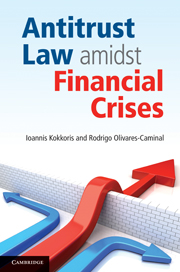Book contents
- Frontmatter
- Contents
- Foreword by Philip Lowe
- Foreword by Frederic Jenny
- Preface
- Table of cases
- Table of treaties and other international instruments
- Introduction
- 1 Introduction to competition law: EU, US and UK
- 2 Some notes on crises
- 3 Failing-firm defence
- 4 Efficiencies
- 5 Crisis cartels
- 6 State aid (Phedon Nicolaides)
- 7 Competition enforcement in periods of crisis
- 8 Conclusion
- Index
7 - Competition enforcement in periods of crisis
- Frontmatter
- Contents
- Foreword by Philip Lowe
- Foreword by Frederic Jenny
- Preface
- Table of cases
- Table of treaties and other international instruments
- Introduction
- 1 Introduction to competition law: EU, US and UK
- 2 Some notes on crises
- 3 Failing-firm defence
- 4 Efficiencies
- 5 Crisis cartels
- 6 State aid (Phedon Nicolaides)
- 7 Competition enforcement in periods of crisis
- 8 Conclusion
- Index
Summary
The Chinese use two brush strokes to write the word ‘crisis.’ One brush stroke stands for danger; the other for opportunity. In a crisis, be aware of the danger – but recognize the opportunity.
John Fitzgerald Kennedy (1917–63)In the present crisis, government is not the solution to our problem; government is the problem
Ronald W. Reagan (1911–2004)Introduction
The global recession illustrates that assumptions of market efficiency are misplaced where systemic uncertainty roams the marketplace. As Devlin argues, ‘it reveals that macroeconomic fluctuations cannot be controlled by monetary policy alone’. This chapter will therefore address whether competition policy has or should have a different role in periods of crisis. It will examine in detail the application of competition legislation on crisis cartels, mergers and state aid. The aim of the chapter is to present how competition enforcement should be applied on these issues in periods of crisis.
As John Fingleton, the chairman of the OFT, argues, the crisis brought its own challenges in the temptation to form cartels or to engage in other forms of permissible or non-permissible horizontal competition. In addition, more failing-firm defence arguments in mergers were likely, and the view that loss of competitive rivalry was not significant in the existing economic conditions was advanced.
In the past, economic recessions have often been followed by efforts to change the legal framework of competition, in order to preserve people's faith in the free-market system.
- Type
- Chapter
- Information
- Antitrust Law amidst Financial Crises , pp. 389 - 498Publisher: Cambridge University PressPrint publication year: 2010

